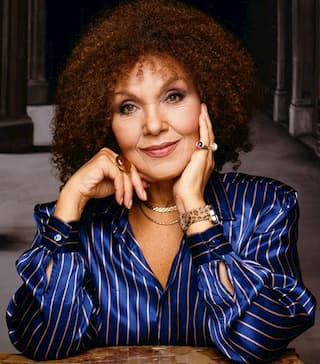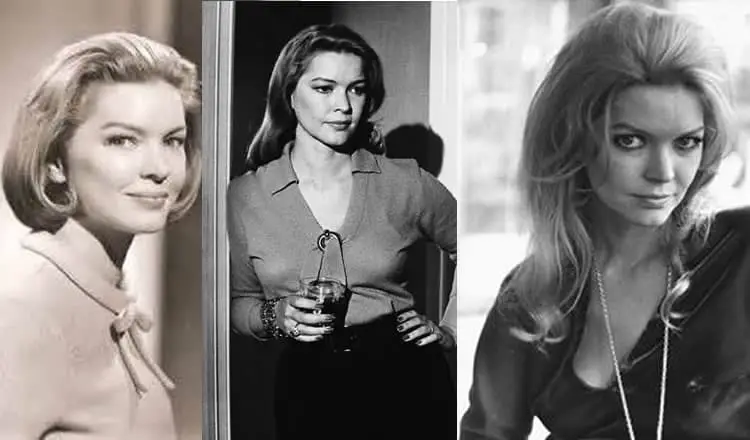Isabelle Adjani Biography
She was born on 27 June 1955, she is a French film actress and singer. She is one of the most acclaimed French actresses of all time. A five-time winner of the César Award for Best Actress, she won for Possession (1981), One Deadly Summer (1983), Camille Claudel (1988), La Reine Margot (1994), and Skirt Day (2009), making her the only actress or actor in history to have five wins. She was made a Chevalier of the Legion of Honour in 2010, and a Commander of the Order of Arts and Letters in 2014.
Adjani’s performance as Adele Hugo in the 1975 film The Story of Adele H. earned her the first of two nominations for the Academy Award for Best Actress. Her second nomination for Camille Claudel made her the first French actress to receive two nominations for foreign language film.
She also won Best Actress at the 1981 Cannes Film Festival for Possession and Quartet, and the Silver Bear for Best Actress at the 1989 Berlin Film Festival for Camille Claudel. Her other films include The Tenant (1976), Nosferatu the Vampyre (1979), Subway (1985), Diabolique (1996), and French Women (2014).
Isabelle Adjani age
Isabelle Yasmina Adjani was born on 27 June 1955 in the 17th arrondissement of Paris, to Mohammed Cherif Adjani, an Algerian Kabyle father and Emma “Gusti” Augusta Schweinberger, a German Catholic mother from Bavaria.
“Gusti” met Adjani’s father, Mohammed Adjani, near the end of World War II, when he was in the French Army. They married and she returned with him to Paris, not speaking a word of French. She asked him to take Cherif as his first name as it sounded more “American”.
Isabelle grew up bilingual, speaking French and German fluently, in Gennevilliers, a northwestern suburb of Paris, where her father worked in a garage. After winning a school recitation contest, Adjani began acting by the age of 12 in amateur theater. She successfully passed her baccalauréat and was auditing classes at the University of Vincennes in 1976.
Adjani had a younger brother, Éric, who was a photographer. Éric died on 25 December 2010, aged 53.
Isabelle Adjani children
In 1979, she had a son, Barnabé Saïd-Nuytten, with the cinematographer Bruno Nuytten, whom she later hired to direct her project Camille Claudel, a biopic of the sculptor who was best known as the lover of Rodin.
From 1989 to 1995, she had a relationship with Daniel Day-Lewis, who left before the birth of their son, Gabriel-Kane Day-Lewis, in 1995.
Isabelle Adjani movies/Isabelle Adjani films
1990 Lung Ta: Les cavaliers du vent
1993 Toxic Affair
1994 Queen Margot
1996 Diabolique
1998 Paparazzi Herself
1999 Bonne Nuit
2002 La Repentie
2003 Bon voyage
2008 Figaro
2010 Mammuth
2011 Aïcha
2012 David et Madame Hansen
2013 Ishkq in Paris
2014 Sous les jupes des filles
2016 Carole Matthieu
2017 Call My Agent!
2018 The World Is Yours
Isabelle Adjani possession
Possession is a 1981 French-German psychological horror-drama film co-written and directed by Andrzej Żuławski and starring Isabelle Adjani and Sam Neill. The plot obliquely follows the relationship between an international spy and his wife, who begins exhibiting increasingly disturbing behavior after asking him for a divorce.
Filmed in Berlin in 1980, the film debuted at the Cannes Film Festival, where Adjani won the award for Best Actress for her performance. Possession was Żuławski’s only English-language film. In recent years, it has developed a cult following.
Plot
Mark is a spy who returns home to Berlin from a mysterious espionage mission to find that his wife, Anna, wants a divorce. She won’t say why, but insists it’s not because she’s found someone else. Mark reluctantly turns the apartment and custody of their young son, Bob, over to her. Later, he pays a visit to their flat to find Bob alone, unkempt, and neglected.
When Anna returns, he refuses to leave her alone with the child but attempts to make amends. He stays at the apartment to care for Bob but Anna leaves in the middle of the night.
Mark receives a phone call from Anna’s lover, Heinrich, telling him that Anna is with him. The next day, Mark meets Bob’s teacher, Helen; inexplicably, she looks identical to Anna but with brilliant green eyes. Mark visits Heinrich, and the two men fight. Mark returns home to find Anna, and beats her, after which she flees. The next morning, they have another heated argument during which she cuts her own neck with an electric knife.
Meanwhile, a private investigator hired by Mark to follow Anna discovers she has a second flat in a derelict apartment building. Posing as a building manager, he enters the flat to find a bizarre creature in the bedroom. Anna kills the investigator with a broken bottle.
Zimmerman, the lover of the missing private detective, contacts Mark inquiring about his whereabouts; Zimmerman goes to the flat himself, where he finds the creature as well as his dead lover’s body. Anna beats Zimmerman in a rage before stealing his gun and shooting him to death.
Anna returns to the flat she shares with Mark, and continues erratic behavior, such as placing clothing in the refrigerator and food in the bedroom. She recounts to him a violent miscarriage she suffered in the subway while he was gone, which she claims resulted in a nervous breakdown; during the miscarriage, she inexplicably oozed blood and fluids from her orifices.
She ominously tells him she “miscarried Sister Faith, and what left was Sister Chance.” Later, Heinrich goes to visit Anna at her second flat, where he discovers the creature, as well as a collection of dismembered body parts in her refrigerator. Anna attacks him, and Heinrich flees, bleeding.
Heinrich calls Mark from a bar down the street and begs him to pick him up. Mark stops by Anna’s apartment first, and discovers the body parts; the creature, however, is nowhere to be seen. Mark leaves to meet Heinrich at the bar, where he murders him in the bathroom and stages it to appears as an accidental death. He then lights Anna’s apartment on fire before fleeing on Heinrich’s motorcycle. He returns to his and Anna’s flat where he finds her friend Margie’s corpse outside.
He drags the body inside where Anna greets him, and the two have sex in the kitchen. After, he makes plans to cover up Margie’s death. Heinrich’s mother phones Mark inquiring about her son. When he goes to meet with her, she commits suicide by poisoning herself.
The next day, as Mark wanders the street, he meets up with his former business associates. They insist he do business with them again. Mark is evasive and flees on Heinrich’s motorcycle. He returns to Margie’s apartment to find it surrounded by both police and his former employers. He stages a distraction, allowing someone, possibly Anna, to sneak away in Mark’s car, but Mark is wounded in the ensuing shootout.
Once again fleeing, he has a horrific accident and races into a building where he is pursued by Anna, the police and his business associates. Anna tells him, “It is finished now,” and reveals the creature, now fully formed as Mark’s doppelgänger. Mark raises his gun to shoot it but he and Anna are gunned down by a hail of bullets from below. Bloodied and dying, Anna lies atop Mark and uses his gun to shoot herself in the back. She dies in his arms and he jumps to his death through the stairwell. The doppelgänger flees through the roof.
Later, Helen is at the flat babysitting Bob when the doorbell rings. Bob implores her not to open the door, but Helen ignores him. From outside, the sound of sirens, planes, and explosions fill the air. Bob races through the flat into the bathroom, where he floats in the bathtub face-down as though dead. The silhouette of the doppelgänger is seen from the frosted glass door. Helen stares, her brilliant green eyes illuminating.
Isabelle Adjani interview
Becoming the youngest nominee for a Best Actress award at the Oscars, when she was 19, for the film “The Story of Adele H” directed by François Truffaut, she was soon offered a huge number of roles in films as diverse as Werner Herzog‘s “Nosferatu the Vampyre” and Luc Besson’s “Subway,” and she’s since gone on to win five César awards.
Adjani’s latest turn is in Louis-Julien Petit‘s “Carole Matthieu,” an adaptation of the novel by Marin Ledun, where she plays a workplace physician in a call center who decides to do something about the physical and emotional suffering her clients are experiencing in the workplace.
Do the characters you play stay with you?
I’m part of them, and they are part of me. They have given me something that has made me evolve in a little part of my soul. I feel emotional about them. Being an actress all my life, or since I was very young, has not been a waste of time. They are staying with me, and we are one. We met, we became one person, and then we had to separate. It is not like a lot of entities taking possession of my being. It is like when you fall in love with a book, and a character becomes some sort of guide within yourself. It changes you, and can even affect your destinies.
Why did you become an actress?
I have become an actress to make some of my drama that came from literature come true. That is why I like so much period pieces. If I believed in a former life, I would feel they were souls from another time. When I act, I love to jump into a world of emotions, of everything that made me who I was, as a small girl.
How do you feel about your character, Carole Matthieu?
What I have for her is empathy, because she has been weakened by the strength she has sacrificed for the sake of others. That is what made me close to her. She has become blinded by her task as a savior. In order to go all the way, she has gone too far to go back.
It is a character I have compassion for, more than one that has anything to do with me, even though I am able to take care of others. For me, to be an actress is to take care of other people. What we do is organize through feelings and emotional transmission. That’s what great actors do for me. Not just entertain people for a couple of hours. That is not enough.
Do you care about the characters you play?
Yes, I do, which does not mean I can’t play an awful person. It can be fun, but it’s more like a catharsis. It can be fun as an actress to embody the nasty stuff, and try to make sense out of it. You have different ways to care about them, depending on your needs. I like the idea of nursing the characters. I love the notion of exchange.
The part you play in “Carole Matthieu” relates to things going on in France. Do such things concern you?
It is something that the director and myself, with the author, got really concerned by. We thought there was some sort of emergency to talk about. We wanted the film to happen, as fast as possible, to give people an open space to speak up. This is from fiction, but we wanted to use fiction to approach reality, with whoever can make change for them.
With [the director], he only wants to make social subjects and is a great admirer of Ken Loach, and really wants to address the problems in France in a way that they have not been done yet. There is way to address those suicides. When it happened, people said people must have problems outside of their work. They were not aware that it can come from the way they were treated at work. Even in the medical field, there was a cardiologist that committed suicide a few years ago.
How is the situation for women in the film industry in France?
It was too soon in France for someone to understand an actress who would produce when I first tried. American actresses are much better at doing that. France is the country where the producer is God, the director is nothing, and the actress belongs to the director. It is now changing, and you don’t have to wait for the God to choose. I’m working on developing a few projects. I have been offered projects, as a producer and actress. I think the more you work, the less tired you get. I like to work with teams and people.
How do you choose your projects?
To me, it is all about making sense. When you are an actress, there are so many films that you do, and so many that you don’t. There are reasons for why you really try to make something happen, or otherwise I feel bored or guilty doing it (if it wasn’t meaningful). If I ask if it means a lot to me, and everyone else, then it is all good. I admire Daniel Day-Lewis, because he can do a film every four years and it becomes the center of his life and the full reason to become an actor. I love actors that give you the feeling that it had to exist, that found a way to make their convictions come true. I’m not saying it always happens like that, because I have been like, “I have to go to work.”
You have taken a few breaks in your career.
It is just life. I don’t like to know about my age. I don’t like my age to be said. I am like, “Oh my God. That’s just me. I am a dreamer.” I am lucky to be around and out there, and to be able to choose the right project. The reasons are rational only for me. I have other fields of passion, like my children and others. In life, you are given a lot, and are being asked a lot. You have a chance to say “No,” or “I will be there for you.” Everyone has a right to decide how they will lead their lives. Life is complicated enough. They have a right to [decide].
How was it working with Andrzej Zulawski?
“Possession” is only the type of film you can do when you are young. He is a director that makes you sink into his world of darkness and his demons. It is okay when you are young, because you are excited to go there. His movies are very special, but they totally focus on women, as if they are lilies. It was quite an amazing film to do, but I got bruised, inside out. It was exciting to do. It was no bones broken, but it was like, “How or why did I do that?” I don’t think any other actress ever did two films with him.
Daniel Day Lewis Isabelle Adjani
His love affair with Isabelle Adjani lasted five years and together they had a child, Gabriel-Kane, born just after their separation. Today aged 22, Gabriel-Kane walks the runways for big brands (he was the Zadig & Voltaire muse in 2016 and is today the face of Paco Rabanne), but mainly devotes himself to his real passion, music. He released a first track and video last summer, Ink in my veins, resonating somewhere between electro and American R’n’B.
One Deadly Summer
Isabelle Adjani won a César award for her performance in this film. The film was a massive hit in France gaining 5,137,040 admissions and was the 2nd highest grossing film of the year. The film is based on a 1977 novel by Sébastien Japrisot
Plot
In this tragic tale of misunderstanding, obsession, and increasing madness, “Elle,” a beautiful young woman (Isabelle Adjani) settles into a small town in the south of France with her introverted mother (Maria Machado) and physically handicapped father and soon becomes the subject of wild speculation because of her aloofness and at the same time, her obvious sexuality.
The young woman is actually caught up in the desire to avenge the long-ago rape of her mother by three men who had arrived at her isolated house in a van which contained an old piano which they were delivering.
A shy car mechanic (Alain Souchon) becomes enamored of her, and the woman suddenly sees him in a different light when she learns that his father, now dead, was an Italian immigrant who had owned and tried unsuccessfully to pawn the piano.
Intent on taking action against the mechanic’s family to right the wrong suffered by her mother, the daughter begins to lose her grip on sanity when she finds out that the men she suspects of the rape are actually innocent. In fact, her father had long ago exacted his own vengeance on the real culprits.
This knowledge pushes her over the edge, and she has to be institutionalized. Meanwhile, the young mechanic misunderstands what happened and that leads to tragedy; he tracks down and kills the innocent men Elle had suspected of raping her mother, believing them to be responsible for Elle’s current condition.
Isabelle Adjani subway
Subway is a 1985 French comedy drama film directed by Luc Besson and starring Isabelle Adjani and Christopher Lambert. The film is classified as part of the cinema du look movement.
Plot
Having stolen some compromising documents from a powerful and successful entrepreneur/gangster at a party, a man known as Fred (Lambert) escapes from the police and takes refuge in the underground world of the Paris Métro stations and tunnels. There he joins the dwellers and befriends several colourful characters, including others who are living under the subway to avoid police arrest.
While the gangster’s henchmen try to find Fred, he develops a romance with the gangster’s young trophy wife Héléna (Adjani). She had originally invited Fred to the party featured at the opening of the film, and is bored with her gilded-caged life.
Fred forms a pop band with some of his friends, such as “The Drummer” (Reno) and Enrico (Serra), who compose the songs. While Fred is working on this project, Héléna’s powerful husband pressures the police to find the fugitive.
One of Fred’s sidekicks, The Rollerskater, who has been wanted by the police for a long time, is captured by Commissioner Gesberg (Galabru). Fred and his friend The Florist rob a train carrying money; The Florist escapes, leaving Fred with the loot.
Fred uses money from the robbery to pay off a band scheduled to perform in the subway station. His new band replaces them but, at their performance, Fred is searched for by both the police and a henchman of Héléna’s husband.
The henchman shoots Fred just as Héléna was about to reach and warn him of danger. The film ends with Héléna kneeling beside Fred, who is lying on his back, looking content and singing along with the band. They are playing and being applauded by the audience in the background.
Isabelle Adjani pull marine
Artist: Isabelle Adjani
Album: Pull marine
Released: 1983
Isabelle adjani News
Dans @blushdreammag #20 #cover #une #photoshoot #luxury #jewelry #lifestyle #fashion ?@sandrafourqui ? styliste @catherinebaba coiffure @cedricchami ? @eliesaabworld ? bague @vhernier collier @schreinerfinejewellery mise en beauté @laurence.azouvy pour @lorealmakeup #loreal #egeriemonde
About InformationCradle Editorial Staff
This Article is produced by InformationCradle Editorial Staff which is a team of expert writers and editors led by Josphat Gachie and trusted by millions of readers worldwide.
We endeavor to keep our content True, Accurate, Correct, Original and Up to Date. For complain, correction or an update, please send us an email to informationcradle@gmail.com. We promise to take corrective measures to the best of our abilities.






